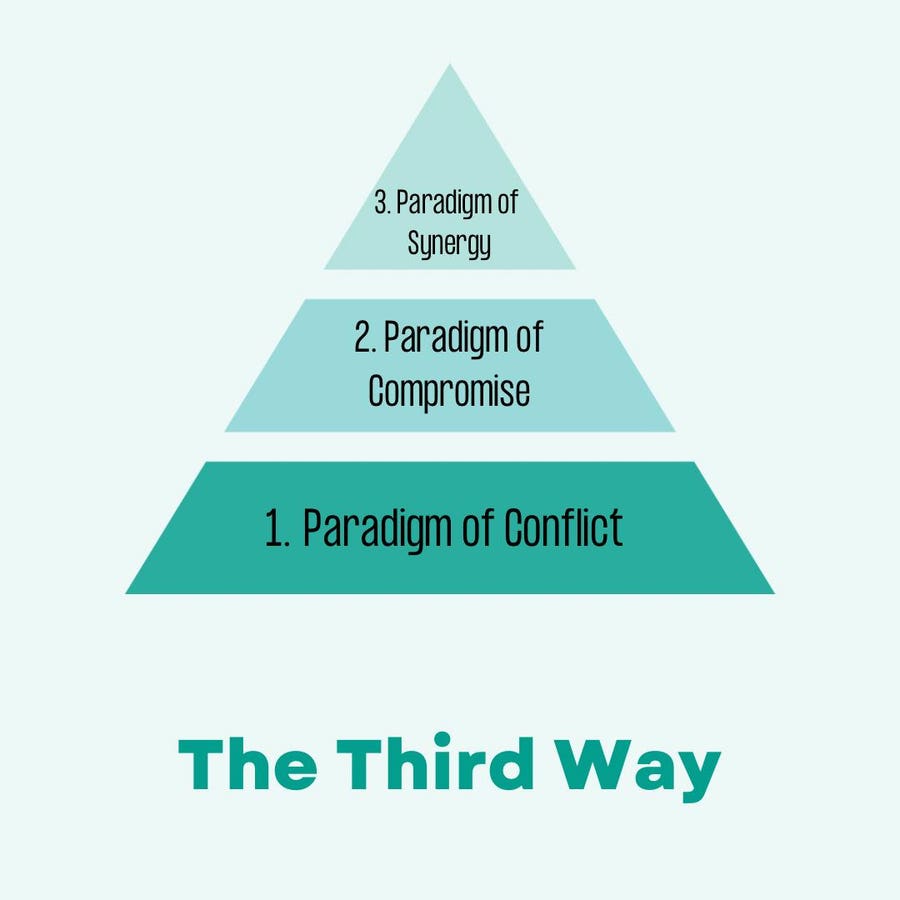The world stands at the precipice of massive change as we face the existential challenges of the climate crisis and a new definition of the role and purpose of humans brought about by AI. We are at the crossroads of unimaginable transformation that demands a new level of human collaboration.
I have reflected deeply on these topics, discussed with academics and professionals from all over the world, and read as much literature as I could on how we can find a way to work together for the benefit of all humankind because now, more than ever, we need a new way of engaging these challenges. As the saying goes: what got us here will not get us where we need to be.
I tried to formulate a very simple framework based on Spiral Dynamics which explains the transformative journey we are on from conflict, to compromise, and ultimately to the peak of synergy. The framework outlines the only way possible we can solve the imminent and existential challenges that our generation faces: The Third Way.
I have distilled this framework into three paradigms, which I outline below.
1. The Conflict Paradigm: A Stalemate of Beliefs
In this scenario, two parties have opposing views: they disagree and leave with their original views intact. Imagine two neighbors fighting over a piece of land. They are deeply entrenched in their viewpoint, believing their claim to the land is the only valid one. They engage in heated arguments, with neither side willing to listen or empathize with the other’s perspective. The dispute escalates, possibly leading to legal battles or ongoing animosity. No resolution is reached, and both parties remain dissatisfied, with the land itself potentially neglected or becoming a symbol of their conflict often leaving bitter memories that are likely to be transferred through generations.
2. The Compromise Paradigm: Settling for Less
Two parties with opposing views listen to each others opposing views and find a compromise that both can live with, however find worse than their original solution. Here, the neighbors recognize the need to find some middle ground. They engage in discussions and negotiations, each presenting their case. Eventually, they agree to divide the land, with each getting a portion. Both feel they have given up more than they wanted, leading to a begrudging acceptance rather than a genuine resolution. The land is split, but neither neighbor is truly happy with the outcome. This is the definition of lose-lose in the sense that both parties have to give up something to reach the middle ground leaving neither party genuinely satisfied. Compromise can be a curse as it can often create unintended consequences further down the line.
3. The Synergy Paradigm: The third way
The pinnacle of this transformative journey is the Synergy Paradigm. It’s where magic happens but requires the most effort and the ability to leave egos at the door. Two parties with opposing views truly listen to each other, value each other’s perspectives and based on holistic understanding form a third option that both believe is better than their original view. The approach is fundamentally different. The neighbors come together, not just to negotiate, but to understand each other’s needs and perspectives.
Through open and empathetic dialogue, they discover a shared interest in gardening. This leads to an innovative solution: transforming the disputed land into a communal garden. Both contribute to its development, creating something that is more valuable to each of them than what they originally sought. The land becomes a source of community and beauty, a testament to what can be achieved through collaboration and mutual understanding.
As we stand at a pivotal moment in history, faced with daunting challenges like climate change and the rise of AI, the need for a synergetic approach has never been more pressing. The large majority of the global population is yet to embrace this paradigm requiring an urgent widespread shift in our collective mindset.
Evolution always has an individual and a collective angle. Individuals need to embrace change, leave their comfort zone and learn to engage in synergetic behavior and the collective needs to find ways to foster synergetic behavior starting from early childhood education, to promoting synergetic values and incentivising individuals to act in synergistic manner.
To forge a path through the complexities of our era, embracing the Synergy Paradigm is not just beneficial – it’s essential. It’s about deepening connections, unleashing creativity, and building a society that collaborates innovatively. Our mission is monumental: to accelerate our evolution towards this paradigm, preparing us to craft a future that is sustainable, inclusive, and thriving for all.
Read the full article here





